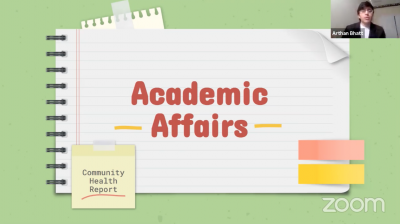
Boston University Student Government heard the yearly academic affairs update and confirmed the Representation Oversight Committee in a Zoom meeting Monday night.
Academic Affairs Director Arthan Bhatt, a senior in the College of Engineering, reviewed three surveys conducted by BU administration: one regarding study spaces, a freshman “How are you?” survey, as well as a Learn from Anywhere survey for faculty and students.
The first survey assessed study space usage across campus from Oct. 13 to Dec. 14, 2020 using data from the Study Space app.
The Yawkey Center for Student Services received the most reservations at 4,135, followed by the George Sherman Union, which received 1,483.
Nearly a fifth of students who used the service only reserved a room one time during the data-collection period. Bhatt cited the application design as a potential reason.
“The app itself is not the greatest app,” Bhatt said.
The administration plans to publish a breakdown of this data for the Spring semester as well.
The “How are you?” survey was offered to all freshmen for the Spring and Fall and offered three answers to its title question: “I need help,” “I’m ok” and “I’m great.” The survey asked students who answered “I need help” what they could use help with that semester.
In the Fall, 58% of respondents said they could use help with academics, making it one of the most commonly cited issues — after “connecting,” which was at 59.9 % — among freshmen who indicated they needed help. The percentage who cited academics dropped to 33.4% in the Spring.
“I think part of this drop could be due to the fact that we got a little bit more used to being online,” Bhatt said, “and with that we probably learned a little bit better on time management.”
Bhatt noted the number remained a concern and showed that many students were still experiencing difficulties with their learning.
“It was still 33 percent of respondents, one out of every three students, still said that they were struggling with their academics,” Bhatt said.
Connecting remained an issue for 54.5% of students respondents this Spring.
The LfA survey questioned both faculty and students about their experiences with the hybrid learning model and organized the data on an individual college level and a university wide basis.
Faculty were asked their satisfaction with the format, and 65% of responding professors taught using the hybrid LfA model.The survey had a 19.5% response rate.
Professors were divided on their satisfaction with hybrid learning. Forty-three percent of professors teaching under the hybrid model responded that they were somewhat or extremely satisfied with the LfA model, while 41% said they were somewhat or extremely dissatisfied with LfA.
Student responses skewed more positive, with 60% of respondents somewhat or extremely satisfied with the LfA experience. However, 52% of student responses also noted they experienced difficulty within the hybrid learning format. The undergraduate total had a 31% response rate.
“That seems to be a common theme throughout this entire sort of survey that they did,” Bhatt said, “was that it was very split down the middle in terms of how people were able to, I guess, perform in the LfA setting. It was about a 50/50 divide.”
Bhatt added that one of the reasons BU is returning to all in-person classes next year is because of this survey’s results.
The full survey detailed different styles of learning students engaged with, the number of students attending classes in person and experiences with remote learning. The data was provided by individual college and the undergraduate population as a whole.
Bhatt also presented updates from individual colleges, in which a team of liaisons, Bhatt included, developed long-term initiatives. Overall the team started 22 separate initiatives, 12 of which are still active.
College of Arts and Sciences initiatives included a syllabus archive, more professional active language learning opportunities, standardized advisor review forms and increased history courses on underrepresented perspectives.
CAS leadership will meet in June about the potential of adding new history courses.
The College of General Studies initiative involves changes to the Common Application. Following a survey of CGS students, the Academic Affairs team found that 50-60% of students unintentionally apply to CGS due to lack of clarity on the Common App.
The Director of Admissions potentially plans on adding events to help clarify the program and is considering changes to the format of the Common App.
For the Sargent College of Health and Rehabilitation Sciences, the Academic Affairs team created a survey about racial inequities in courses. The survey will be distributed after continued discussions with the team and the dean of Sargent.
Dean Mariette DiChristina of the College of Communication committed to adding more training for faculty advisors, completing the central COM initiative.
The Wheelock College of Education and Human Development liaison introduced four separate initiatives, two of which are active: the creation of a new Study Abroad program and instructional videos for self-advising.
The College of Fine Arts, Questrom School of Business and ENG liaisons are no longer working, but started initiatives Bhatt said he hopes can be continued.
The meeting continued with the confirmation of the ROC, which was introduced last week as a way to resolve representation issues for BU student groups.
The ROC was confirmed with 36 votes in the affirmative out of 42 senators present.
Abbigale Shi, editorial page editor of The Daily Free Press, is a Student Government Environmental Affairs cabinet staffer. She was not involved in the editing of this article.
Juncheng Quan, staff writer of The Daily Free Press, is a Student Government CAS Senator. He was not involved in the editing or reporting of this article.
Ilana Keusch, staff writer of The Daily Free Press, is a Student Government Associate Justice. She was not involved in the editing or reporting of this article.












































































































